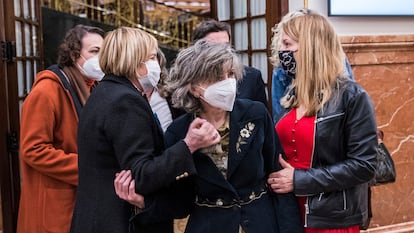Spain approves euthanasia law, becoming the fifth country in the world to regulate the practice
Patients must ‘suffer a serious or incurable disease or a serious or chronic condition’ before they can request help to end their lives according to the legislation, which was opposed by parties such as the PP and far-right Vox
Spain has today joined the likes of the Netherlands, Belgium, Luxembourg and Canada, becoming one of the first countries in the world to regulate euthanasia. The lower house of parliament, the Congress of Deputies, today passed a law that was promoted by the Socialist Party (PSOE), which is governing in coalition with leftist Unidas Podemos. The legislation will come into force in three months.
In order for people to request their life be ended, the affected person must “suffer a serious or incurable disease or a serious, chronic and incapacitating condition,” which causes them “intolerable suffering.” The legislation covers euthanasia, i.e. “the direct administration of a substance by the relevant medical professionals,” as well as what is known as medically assisted suicide, with the “prescription or supply to the patient by a medical professional of a substance, in a way that this can be self-administered, to cause their own death.”
With the approval of the law, Spain is joining the few countries where euthanasia is regulated. In Portugal, the Constitutional Court has opposed such a move, while in Colombia the practice is legal, according to a court ruling, but is not regulated. A similar law is due to come into force in New Zealand in November, while in parts of the United States and Australia it is also permitted.
Vox has already announced that it will appeal the law in the Constitutional Court, and warned that if it should come to power, it will repeal it
Unlike other laws in force elsewhere, however, the Spanish legislation sets out a series of steps that could see the process take up to a month from the moment the patient requests it. This begins with a written request submitted twice over the space of two weeks. In it, the patient must express their clear will to end their life, and they must have been supplied with information about their medical condition and the alternatives that are available to them. Once the process has begun, the patient may change their mind at any time, and once they have received authorization, they can delay its application as long as they want.
Once the second request has been made, the patient’s doctor must pass the request on to the corresponding regional commission, which will appoint two professionals with no connection to the case for its analysis. The commission will then approve or reject the decision reached by these two specialists. The law does not set out the composition of this commission, which will be determined by each region, apart from it having at least seven people and including medical, legal and nursing experts. The commission has 19 days to reply to a request.

The bill passed with 202 votes in favor, 141 against and two abstentions. The coalition government is governing with a minority in Congress, and as such had to seek the support of other parties to pass the bill. Among the opponents to the legislation were the conservative Popular Party (PP), the Navarrese People’s Union (UPN) and far-right Vox. Those groups called for a palliative care law instead, but failed to actually present such a draft law. They claim that this legislation will legalize murder. Vox has already announced that it will appeal the law in the Constitutional Court, and warned that if it should come to power, it will repeal it.
The supporters of the law have said that their work is not yet done. Asun Gómez, whose partner Luis de Marco died after more than a month in agonizing pain, said that she feared that the regional commissions could end up with biases that make it easier in some places to receive the assistance requested than in others. Ángel Hernández, who helped his wife María José Carrasco to die, said something similar. “Now we have to see how it is implemented,” he said.
English version by Simon Hunter.
Tu suscripción se está usando en otro dispositivo
¿Quieres añadir otro usuario a tu suscripción?
Si continúas leyendo en este dispositivo, no se podrá leer en el otro.
FlechaTu suscripción se está usando en otro dispositivo y solo puedes acceder a EL PAÍS desde un dispositivo a la vez.
Si quieres compartir tu cuenta, cambia tu suscripción a la modalidad Premium, así podrás añadir otro usuario. Cada uno accederá con su propia cuenta de email, lo que os permitirá personalizar vuestra experiencia en EL PAÍS.
¿Tienes una suscripción de empresa? Accede aquí para contratar más cuentas.
En el caso de no saber quién está usando tu cuenta, te recomendamos cambiar tu contraseña aquí.
Si decides continuar compartiendo tu cuenta, este mensaje se mostrará en tu dispositivo y en el de la otra persona que está usando tu cuenta de forma indefinida, afectando a tu experiencia de lectura. Puedes consultar aquí los términos y condiciones de la suscripción digital.








































